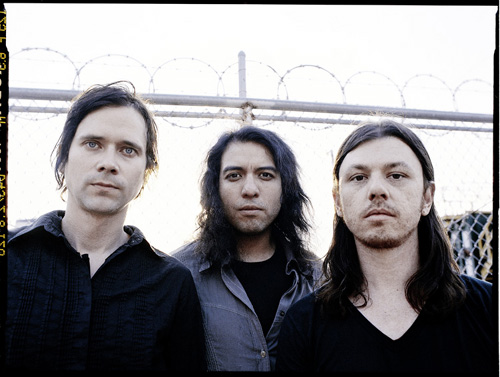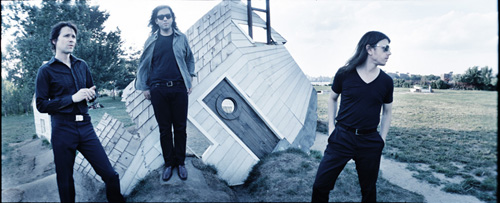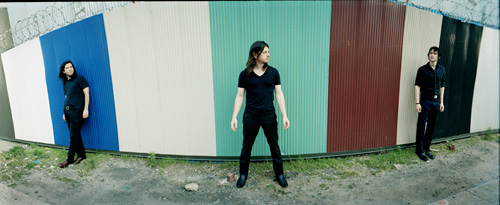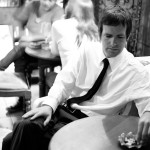
By Arye Dworken
Contrary to popular belief, being a rock star isn’t always glamorous. Especially when you lose an integral band member and part ways with a major label all in the same year. In the Secret Machines‘ case, that integral member also happened to be a blood relative (guitarist/backup vocalist Benjamin Curtis, who’s now crafting crystalline psych-pop in School of Seven Bells).
According to Brandon Curtis (the Secret Machines’ primary songwriter and frontman), the flashy prog-rock trio had an unsure future until recently, when they recruited guitarist Phil Karnats and tracked an (inter)stellar third record. While the self-titled LP’s slightly uncommercial sound isn’t a huge departure from previous releases–drummer Josh Garza still pounds the skins with purpose–it still strikes completely new territory for the Secret Machines by feeling spacious and unhurried.
Brandon talked to us a month before the October 14 release about reinventing the band, starting a new, DIY label, and what it’s like to not be his brother’s keeper.
“It wasn’t my intention to write a record that made people think that I was depressed about Ben leaving”

self-titled: Before the Secret Machines parted with Sire, the band toured with an In The Round setup. That must have been expensive.
Yeah, we had this idea to set up the band in a ring facing each other. To have the audience interaction, each of us had our backs to one-third of the audience but also facing two-thirds of it. We had this massive energy off of that. We saw the opportunity and even though it was super expensive and almost financially impossible, we pulled it off. We filmed it a couple of times and it would have been great if it came out right but the label at the time weren’t interested. We were already spread pretty thin as it was.
Tell me what happened with Sire and the split.
It was really simple. They’ve always been really supportive and really generous. They let us do what we wanted, to let us do things as we wanted them done. They did encourage us to work with mixers but otherwise, they let us run free. The economics of having the Secret Machines on a major label just didn’t work for them.
How did it make you feel to lose that significant cash flow?
There are two aspects of being abandoned by a major. Warner can only stay in business if their bands are selling so many records. I don’t think it was in the cards for us to sell a half-million records. That was obvious. We’re not that kind of band. Then the other part of not performing was that we were aware that they could be full of disappointment and frustration–we didn’t want to let people down and we had great relationships with people there : but it just didn’t work at the end.
The major label system is made up of real personalities. Those personalities were excited to be involved with us as a band. One on one, it was great. But as an entity, it was a completely different story–incongruous. They had money and contacts, but when it came down to being flexible, they couldn’t be. That’s not how major labels work.
Is there a bitter aftertaste?
They paid for us to have some amazing directors for videos. They spent a decent amount of money on us. The concert video that we did that never came out–where we played out in the desert–they paid for that. They were great at financing artistic ventures. If you believe in something, you have to fund it. There’s no such thing as corporate altruism. They wrote the checks but they didn’t get enough from it.
When they signed the band in the first place, what was their intention? What could they have expected from a band that wrote eight-minute songs?
All I know about our meetings with publicists and A&R guys is that they liked the band and the music. It came to a point when their margins couldn’t sustain a band like us. But look at what happened to the Flaming Lips–a band like that sold more albums with each progressive release.
And now you’re on your own.
Yeah, now that we’re working on our own with TSM Recordings and World’s Fair, we’re trying to be smart about it. It’s a very simple strategy. We’re not relying on one thing working out to finance another. If you have a marketing budget, you have to make something successful enough that it can fund it.
There’s a perception of success and failure and when measured against a band like the Chili Peppers, Secret Machines never had a chance to be successful. We still haven’t sold enough to recoup the money we spent. But some of my favorite bands in the world are not selling a lot of records and they’re also perceived as being successful.
Secret Machines came from Ace Fu, which was a small indie. What do you think would have happened if you signed to a major indie?
We would have had a different kind of experience. But when we were offered the situation with Warner Brothers, we dealt with things as they happened. We’ve never really focused on thinking about what could have happened. They offered us the most enthusiasm and the most creative freedom. And you know, when we released the Ace Fu record there wasn’t a ton of interest. That’s the truth. The indies never came crawling out to sign us.
How will touring change now that the budget is smaller?
Es Devlin, who worked on the Glow In The Dark tour for Kanye, is working with us to come up with a stage design. We’re super excited about that. There’s a lot of lights in the context of the spaces. We’re relating to the space we’re playing in–that’s the theme. Some fixed sculptural figure on stage that we can relate to … I don’t want to say too much about it. We have a model of it and we’re in the process of having it built. We’re then going to tour with it. It’s a bit like Eddie from Iron Maiden. [laughs]
It’s really simple but will hopefully it will work out.

Are you still in touch with Warner Brothers?
I imagine that there are some weird awkward feelings towards us. We haven’t spoken to anyone there since then. It feels good to be out of there.
Now the other big change is that your brother Ben left the band. How was that affected the Secret Machines?
Playing in the band with my brother was a great thing. I traveled with him and played music with him : it was wonderful. We were best friends and I wouldn’t trade that for the world. Being on the road without him has been sad. I do allow myself some nostalgia in that sense. He’s really happy doing his new band and they’re developing as a family. I’m proud of him and it’s a big success. That makes me really happy.
Now as far as Phil the new guitarist is concerned: we’ve been friends for about 12, 13 years. I’ve always thought he was a great guitar player. When Ben talked about leaving, Josh and I talked about going on. Would we still play music? We played some songs that I had written and it still felt like Secret Machines. The gist of the band was still there : and it challenged us to grow and take a step in a different direction. There was no way would could have plugged in guitar player X and had that work. Phil was right and we’re so lucky to have had him.
How has Ben’s departure affected the songwriting? Some of the songs are quite melancholic, like “Now You’re Gone.”
Ben wasn’t around for any of the new songs. I was working on those songs just because I’m always working on songs. I didn’t even know at the time what they were for. Josh and I fleshed them out and we tried some of those songs for a live audience.
Ben leaving the band definitely informed the lyrics of the record. Although, I don’t think it’s as literal as it appears. It wasn’t my intention to write a record that made people think that I was depressed about Ben leaving. Ultimately, I think this record was an effort to not limit myself to one area. Ten Silver Drops was about my girlfriend leaving me : But c’mon, get over it. It happens. So this isn’t a record about how the band almost broke up. It’s about a few themes.
Do you regret the personal nature of Ten Silver Drops? A lot of critics latched on to the whole girlfriend-dumping thing.
No, not at all. It’s a dear record to me. I regret that its not seen as complex as it was intended to be. Yes, we all got dumped. And some of them are about that loss, that feeling. But to say it’s a break-up record, that’s limited and very narrow. As far as the new one, we titled it Secret Machines because making that record was a very grounding experience. We rediscovered the pure musical side of our relationships. It’s about being in a band with friends and a drive to express to a vague unrest and unease and also happiness and enthusiasm. It’s not necessarily a return to anything in particular. But we were thinking about writing music like we wrote music in the beginning.
Did Ben hear the new record?
Yeah, we’ve played some music for him. It was awkward for me because I desperately wanted his approval. He was really complimentary and he was even at that Annex show that debuted some of the new songs.
Has your relationship improved or worsened since he left the band?
He’s my brother and that’s foremost. I still see him often.
Secret Machines can be seen as your band. Did that have anything to do with Ben’s leaving?
Yes, sure. I can totally see that. I can’t psychoanalyze my brother but I’m sure it feels great for him to do things his way and not being in a band with his brother. I bet it gets tiresome after a while hearing about ‘your brother who writes the songs’. It’s best for him to be judged in the context of his own work. He hasn’t said that to me but that’s what I’m assuming.
On the eve of the release, I’m wondering how you’re feeling. It’s a new band on a new label without your brother.
We just did six weeks of shows and I was curious of past supporters and what they would think of the shows, the new stuff. I wanted to live up to expectations : I knew there would be some people who would say this isn’t the Secret Machines but there will be some who would say that it would be better. It’s always not easy to hear criticism, and it’s always hard to hear people not accept things I’ve put my heart into. But that’s the risk of putting yourself out there. I’m looking forward to the reaction.
Why are there only eight songs on the record especially considering you’ve told me how you’re always writing?
I don’t drive in New York. I commute on subways. So I make albums ideal for those sort of commutes. Forty minutes felt like the perfect average.


